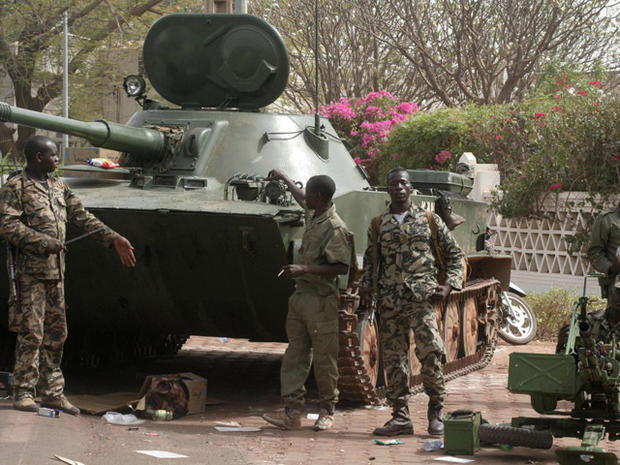Will Mali's new junta end Africa's coup era?
(CBS News) It is hard to find a modern African country that wasn't at least once taken over by a military coup after the end of World War II. All through the Cold War era and into the beginning of the 21st Century, so long as the military coup wasn't a Communist one, Western leaders largely let the situations play themselves out, offered little more resistance than stern words, and hoped for a positive outcome.
That tolerance no longer seems to be there, and the main resistance to coup takeover bids is coming from a new place: African leaders themselves.
Last Thursday, mutinous soldiers in Mali upset over the government's apparently bumbling response to the festering Tuareg rebellion spontaneously rioted and seized control of the state television and radio stations, as well as the presidential palace. Leaders of the mutiny declared a coup, and the relatively popular (and democratically elected) president, Amadou Toumani Toure, has not been seen in public since.
Mali state TV goes off air; fear of countercoup
Mali gov't ousted by military coup
The coup may have taken many by surprise, but the response has been swift. While Western leaders verbally condemned the coup, on Tuesday, Mali was suspended from an important regional economic bloc, ECOWAS, and its leaders have put peacekeepers on standby, ready to intervene, according to the Associated Press. The move indicates that Mali's neighbors are prepared to use force to restore Toure to the presidency if necessary.
ECOWAS and Ivory Coast President Alassane Outtara said: "We cannot allow this country endowed with such precious democratic instruments, dating back at least two decades, to leave history by regressing. It's why Mali needs to immediately return its democratic institutions to normal. This position is nonnegotiable."
It is worth noting an irony here: Outtara himself was forced to use force in 2011 to take over the Ivorian presidency when predecessor Laurent Gbagbo refused to accept election results.
Such is the challenge that Africans have faced when it comes to their relatively new history with democratic rule. Mali's democracy is indeed "precious" and unique in Africa, and at only 20 years old, is already one of its oldest.
While little is known about the coup leaders, there is no way they could sustain running the country if their neighbors cut them off economically, which is saying nothing of governing a population that apparently likes the president they ousted. Perhaps their inevitable fall will signal an end to the wanton excesses of throne-hungry military leaders that have ruled large swaths of Africa for several generations now.
